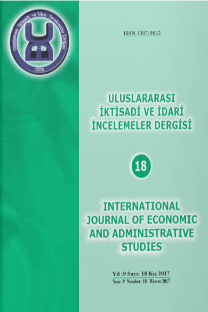İTHALAT VE İHRACAT ENFLASYONU ŞOKLARININ TÜRKİYE CARİ İŞLEMLER HESABI ÜZERİNDEKİ ETKİSİ
dinamik stokastik genel denge modeli, cari işlemler hesabı
THE IMPACT OF IMPORT AND EXPORT INFLATION SHOCKS ON TURKEY CURRENT ACCOUNT
___
- Cebi, C. (2012) The interaction between monetary and fiscal policies in Turkey: An estimated New Keynesian DSGE model. Economic Modelling, 29 (4), 1258-1267.
- Deniz, P., Aslanoğlu, E. (2014) Consumer Confidence in a DSGE Model for Turkey. Allied Social Science Associations, January 3-5, 2014, Philadelphia, USA.
- Escude, J. E. (2012) A DSGE model for a SOE with Systematic Interest and Foreign Exchange policies in which policymakers exploit the risk premium for stabilization purposes. Dynare Working Paper Series, Working Paper no. 15.
- Deniz, P., Aslanoğlu, E. (2014) Consumer Confidence in a DSGE Model for Turkey. Allied Social Science Associations, January 3-5, 2014, Philadelphia, USA.
- Escude, J. E. (2012) A DSGE model for a SOE with Systematic Interest and Foreign Exchange policies in which policymakers exploit the risk premium for stabilization purposes. Dynare Working Paper Series, Working Paper no. 15.
- Huseynov, S. (2010) An Estimated DSGE Model For Turkey With a Monetary Regime Change. Master Thesis, Central European University, Budapest-Hungary.
- Lubic, T.A., Schorfheide, F. (2007) Do Central Banks Respond to Exchange Rate Movements? A Structural Investigation. Journal of Monetary Economics, 54(4), 1069-1087.
- Ozcelebi, O., Yildirim N. and Kansu A. (2014) Possible Effects of domestic and foreign factors on monetary policy implementation in Turkey: a DSGEVAR Approach. Economic Research, 27, (1), 590606.
- Rothenberg, A. D., Warnock, F. E. (2006) Sudden Flight and Sudden Stops. Institute for International Integration Studies, University of Dublin. Working Paper No. 187.
- Villaverde, J. F. (2009) The Econometrics of DSGE Models. NBER Working Paper, No. 14677.
- ISSN: 1307-9832
- Yayın Aralığı: Yılda 4 Sayı
- Başlangıç: 2008
- Yayıncı: Kenan ÇELİK
KIŞ TURİZM MERKEZİ SEÇİMİ İÇİN KRİTER AĞIRLIKLARININ BULANIK AHP KULLANILARAK BELİRLENMESİ
TÜRKİYE’DE SEKTÖRLERİN ÖLÜMLÜ KAZA TÜRLERİNE GÖRE KÜMELENMESİ: İKİLİ KÜMELEME YÖNTEMİ
Ahmet KOCATÜRK, Bülent ALTUNKAYNAK, H. Hasan ÖRKCÜ
EKONOMETRİ ÖĞRENCİLERİNİN SAYISAL DERSLERDEKİ AKADEMİK PERFORMANSI: MARKOV MODELİ İLE BİR HESAPLAMA
Ersin KIRAL, Can MAVRUK, Gülsen KIRAL
TÜRKİYE’DE ÖZNEL İYİ OLUŞ’UN YAŞAM ALANLARI YAKLAŞIMI İLE ÖLÇÜLMESİ
Süreyya DAL, Mustafa SEVÜKTEKİN
Mehmet AKSARAYLI, Osman PALA, Dilayla BAYYURT, Mehmet Akif AKSOY, Ayşegül CENGER
TÜRK BANKACILIK SEKTÖRÜNÜN KIRILGANLIĞI: AMPİRİK BİR ÇALIŞMA
Ömer Faruk BÖLÜKBAŞI, Emre ÜRKMEZ, Osman KARAMUSTAFA
YÜKSEK DERECEDEN MOMENTLER VE BULANIK ENTROPİYE DAYALI PORTFÖY OPTİMİZASYONU
BİTİŞME ANALİZİ FAYDALARININ GENELLEŞTİRİLMİŞ TAHMİN DENKLEMLERİ İLE BELİRLENMESİ
Duygu USTA, Ahmet Mete ÇİLİNGİRTÜRK
KONTEYNER TERMİNALİNDE RIHTIM VİNÇ OPERASYONLARININ VERİMLİLİĞİNİN İYİLEŞTİRİLMESİ
